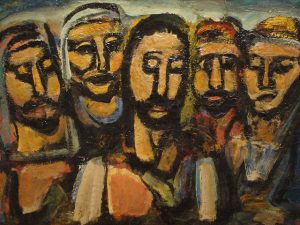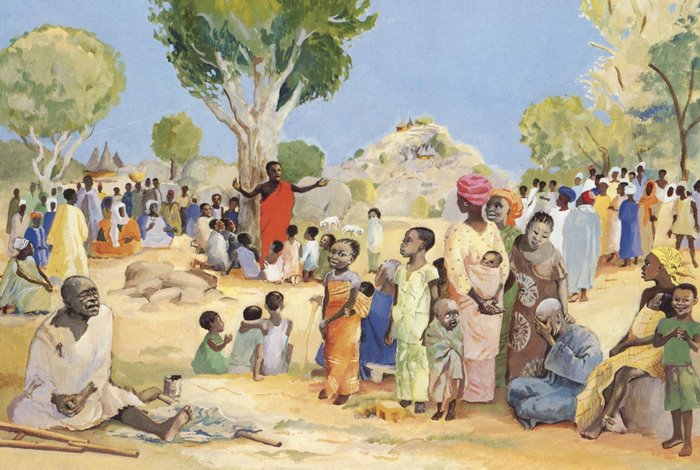Revised Common Lectionary Reflection, Sixth Sunday after the Epiphany, Year C
February 17, 2019
Lessons: Jeremiah 17:5-10, Psalm 1, 1 Corinthians 15:12-20, Luke 6:17-26
Theme: God’s faithful and generous people put their trust in Jesus—even his hard teachings—and commit to follow him.
Key Scripture: Blessed are those who trust in the LORD, whose trust is in the LORD. – Jeremiah 17:7
Preaching/Teaching Reflection
What’s this about a level place in this week’s gospel? Exactly what is Luke trying to communicate to his readers? The notion of a “level playing field” might come to mind, an idiom that refers to creating a situation where everyone has the same opportunities. In response to this lovely ideal, someone with a relatively high “snark” factor, might quip “Well, how’s that working  out?” Not so hot, if we’re honest about it, at least for most of the world’s citizens. Those who think the playing field is level might need to get a new set of glasses.
out?” Not so hot, if we’re honest about it, at least for most of the world’s citizens. Those who think the playing field is level might need to get a new set of glasses.
But is leveling the playing field Jesus’ point here? Earlier this chapter, Jesus is on the mountaintop with his disciples, of whom he selects twelve to be not just disciples but apostles. They will be his closest companions, the ones he trains to lead the ministry when he is gone. The next thing Jesus does is lead them right back down the mountain into this level plain. This is a place where the hurting and broken have gathered. This is the space where people wait to encounter Jesus’ healing power. Here is where the lost, the forsaken, the outcast, and the marginalized collect. In short, this is not your average Sunday morning church service. This level place is where discipleship rubber hits the road.
The apostles are about to be schooled for ministry, to learn about the true cost of following Jesus. And it won’t be an easy lesson. We know they struggled with their role throughout Jesus’ short ministry. They failed to accompany Jesus fully in his most difficult hours. Peter denied Jesus—not once but three times. Judas betrayed Jesus, possibly in hopes of pushing him into revealing his divine glory and setting the people free again.
The apostles didn’t understand that Jesus’ idea of freedom involves surrendering one’s will, laying oneself down at the foot of the cross, and acknowledging one’s need of a Higher Power. Neither do we today. Only by becoming “poor” in the eyes of the world, by refuting society’s claims about consumerism, power, and privilege can one understand and live into God’s reign. Only by hungering for  Jesus can one be filled. Only by weeping at the calamitous state of the world, at the injustice and abuse—by truly seeing humankind’s inhumanity to one another–can there be laughter. And only by holding fast to the Way of Christ, even when it means taking an unpopular or dangerous stand, when it means being ridiculed and reviled, can one truly experience God’s gifts.
Jesus can one be filled. Only by weeping at the calamitous state of the world, at the injustice and abuse—by truly seeing humankind’s inhumanity to one another–can there be laughter. And only by holding fast to the Way of Christ, even when it means taking an unpopular or dangerous stand, when it means being ridiculed and reviled, can one truly experience God’s gifts.
In short, “comfortable” and “Christianity” do not go together like bread and butter. There is, indeed, nothing comfortable at all about discipleship and the gospel. We’re a long way yet from a level playing field, my friends, but the choice to embrace radical discipleship, lavish love, and prodigal generosity is offered us anew every day. The question remains: Will you accept Jesus’ difficult teachings and embrace this beautiful, broken world to love God fully and your neighbor as yourself?
In Worship
Consider ending your worship with a version of this Franciscan Blessing, challenging congregants to experience discomfort, anger, tears, and foolishness.
With Youth
Did you know there’s science behind the concept of “happiness”? You can even take a MOOC (Massive Open Online Course) class through the University of California Berkeley’s Greater Good Science Center. More than 450,000 have taken the course since it was created in 2014. Click here for more information. While you’re there, visit other parts of the center’s website. You’ll find all kinds of useful resources to help facilitate a conversation about happiness with youth.
A fundamental finding from positive psychology is that “happiness is inextricably linked to having strong social ties and contributing to something bigger than yourself—the greater good.” Christians would agree, but we also point to a critical missing link in this scientific postulation—God. Use Psalm 1 as a springboard for discussion about true happiness that comes from paying attention to and following God. Science is great, but God is greater still!
With Children
This week’s focus verse is Psalm 1:6a: “The Lord shows his people how to live…” (ERV)
To illustrate Psalm 1, have the children talk about a recipe for “happiness.” First ask them to give you a definition of happiness. Affirm all answers. Then ask them if they think there’s a recipe for happiness—as we have recipes for cookies. Invite the children to tell you what might be included in a recipe for “happiness.” Tell them that Psalm 1 has some good ideas to cultivate happiness—and the key ingredient is paying attention to God. Read the Psalm with them (you may want to use the ERV). If possible give each child a pint size jar of cookie mix. Click here for a good recipe. Tell them to take the mix home and stir up some happiness with their family. Remind them that even though these cookies will taste mighty sweet, real happiness is found in following God. Finish with a simple prayer.
Weekly Stewardship Bulletin Insert
You, dearly beloved child of God, have been called to a life of radical discipleship! This life will bring you lasting joy, laughter, and fulfillment, but it may also bring you pain, suffering, and exclusion. We are not promised an easy path through this world, but we are promised life eternal and that we will never be left alone. Christ’s power goes with us in the form of the Holy Spirit. How are you stewarding this gift and promise?
Stewardship at Home
Are you a comfortable Christian? “Comfortable” Christianity doesn’t look beyond the surface, sees life in absolutes of black and white, and is content with minimal engagement and transactional ministry. This is the kind of life that Jesus pronounces “woe” upon. It won’t always be this cushy, he says. Conversely, disciples who are hungry for discipleship and good news will be filled. People who are poor enough to rely on God will experience the kingdom, and those who are persecuted and reviled on account of faithfulness to Jesus should rejoice. Want to be discomforted in your journey? Read about some modern day disciples who have and are choosing an alternative path. A few you might consider include Shane Claiborne and The Simple Way, Henri Nouwen and L’Arche, Dorothy Day and the Catholic Worker Movement, the Taize ecumenical Christian monastic fraternity, the Iona Community, and Koinonia Farm. What resonates with you about these communities? What seems difficult or impossible?
Photos: JESUS MAFA, Art in the Christian Tradition; Ben Sutherland, Rousalt’s Christ and the Apostles; and David2223, Creative Commons usage license. Thanks!
Note: Reprint rights granted to congregations and other church organizations for local, nonprofit use. Just include this note: “Copyright (c) 2019, Rev. Sharron Blezard. Used by Permission.” Other uses, please inquire: thewritelife@hotmail.com.




Leave a Reply